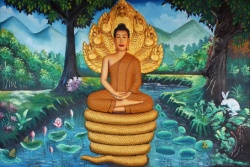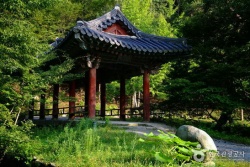Difference between revisions of "Songgwangsa Temple (송광사-순천)"
(Created page with "thumb|250px| Songgwangsa temple is located on the west side of Mt.Jogyesan, and it is famous for being a Sambosachal of Korea. Sambo means three precious tr...") |
|||
| (2 intermediate revisions by one other user not shown) | |||
| Line 1: | Line 1: | ||
[[File:22.jpg|thumb|250px|]] | [[File:22.jpg|thumb|250px|]] | ||
| − | Songgwangsa temple is located on the west side of Mt.Jogyesan, and it is famous for being a Sambosachal of Korea. Sambo means three precious treasures in Buddhism, the Bulbo, Beopbo, and Seungbo. Songgwangsa Temple qualifies as a Seungbo temple, and Seungbo refers to those disciples who learn many things of Buddha and practices them. The reason Songgwangsa temple became a Seungbo temple is because many high | + | |
| − | The road to the temple is covered by huge tall | + | |
| + | [[Songgwangsa temple]]; ([[송광사-순천]]) is located on the west side of [[Mt.Jogyesan]], and it is famous for being a [[Sambosachal]] of [[Korea]]. [[Sambo]] means [[three precious treasures in Buddhism]], the [[Bulbo]], [[Beopbo]], and [[Seungbo]]. | ||
| + | |||
| + | [[Songgwangsa Temple]] qualifies as a [[Seungbo temple]], and [[Seungbo]] refers to those disciples who learn many things of [[Buddha]] and practices them. The reason [[Songgwangsa]] temple became a [[Seungbo temple]] is because many high [[Monks]] were produced from this temple. | ||
| + | |||
| + | The road to the temple is covered by huge tall [[Trees]], and is very beautiful. | ||
| + | |||
| + | From the road, if you cross a valley, a round pavilion bridge called [[Cheongryanggak]] appears. | ||
| + | |||
| + | On the bridge is a pavilion, and you can rest there while you are traveling. Inside the temple, you can see the [[Daeungbojeon]], the main building. | ||
| + | |||
| + | This building has a roof shaped as if it were composed of two roofs. | ||
| + | |||
| + | To one side of the main building is the [[Jijangjeon]], where they have a [[Buddha]] statue, and the [[Seungbojeon]], which tells the [[World]] that the temple is a Seungbo temple. | ||
[[File:221a.jpg|thumb|250px|]] | [[File:221a.jpg|thumb|250px|]] | ||
| − | Songgwangsa Temple has three great treasures: the 'Bisari Gusi', 'Ssanghyangsu', and 'Neunggyeonnansa.' Bisari Gusi is a rice container that was made from a large | + | [[Songgwangsa Temple]] has three great treasures: the '[[Bisari Gusi]]', '[[Ssanghyangsu]]', and '[[Neunggyeonnansa]].' |
| + | |||
| + | [[Bisari Gusi]] is a rice container that was made from a large [[Tree]]. | ||
| + | |||
| + | It was used to [[Store]] the rice for [[Monks]], and because it was so large, it contained rice enough rice for 4,000 [[Monks]]. [[Ssanghyangsu]] is two very large Chinese Juniper [[Trees]]. | ||
| + | |||
| + | Lastly, [[Neunggyeonnansa]] is a plate belonging to [[Songgwangsa Temple]], and it was built with many intricate designs. Make [[Time]] on your trip to see the many national treasures that are located here. | ||
{{R}} | {{R}} | ||
[http://english.visitkorea.or.kr/enu/SI/SI_EN_3_1_1_1.jsp?cid=264304 english.visitkorea.or.kr] | [http://english.visitkorea.or.kr/enu/SI/SI_EN_3_1_1_1.jsp?cid=264304 english.visitkorea.or.kr] | ||
Latest revision as of 18:17, 1 February 2016
Songgwangsa temple; (송광사-순천) is located on the west side of Mt.Jogyesan, and it is famous for being a Sambosachal of Korea. Sambo means three precious treasures in Buddhism, the Bulbo, Beopbo, and Seungbo.
Songgwangsa Temple qualifies as a Seungbo temple, and Seungbo refers to those disciples who learn many things of Buddha and practices them. The reason Songgwangsa temple became a Seungbo temple is because many high Monks were produced from this temple.
The road to the temple is covered by huge tall Trees, and is very beautiful.
From the road, if you cross a valley, a round pavilion bridge called Cheongryanggak appears.
On the bridge is a pavilion, and you can rest there while you are traveling. Inside the temple, you can see the Daeungbojeon, the main building.
This building has a roof shaped as if it were composed of two roofs.
To one side of the main building is the Jijangjeon, where they have a Buddha statue, and the Seungbojeon, which tells the World that the temple is a Seungbo temple.
Songgwangsa Temple has three great treasures: the 'Bisari Gusi', 'Ssanghyangsu', and 'Neunggyeonnansa.'
Bisari Gusi is a rice container that was made from a large Tree.
It was used to Store the rice for Monks, and because it was so large, it contained rice enough rice for 4,000 Monks. Ssanghyangsu is two very large Chinese Juniper Trees.
Lastly, Neunggyeonnansa is a plate belonging to Songgwangsa Temple, and it was built with many intricate designs. Make Time on your trip to see the many national treasures that are located here.

